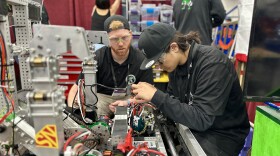President Donald Trump’s decision to withdraw from the landmark Paris climate agreement has set off strong reactions in San Diego’s science community.
“My first reaction was sad because it just sends such a statement,” said Kimberly Prather, distinguished chair in Atmospheric Chemistry at UC San Diego and director of the center. “But then my next reaction is 'We can do this. We still can do this. I’m not ready to give up,'” she said.
Prather sees the agreement as a worldwide pledge to care for the planet. She said Trump's message is troubling.
"Will the public wonder, 'Oh does this mean climate change isn't really happening?'" she said.
Prather studies the effects on the climate of atmospheric aerosols, tiny particles that seed clouds and control how much of the sun’s heat makes it through the atmosphere. Some particles are created naturally from desert dust or ocean sea spray, but increasing amounts are human-made in the form of soot from car exhaust and other pollutants. The particles play a major role in impacting weather patterns and temperatures.
]
“We’re seeing a lot of evidence of where water is falling in one place and nothing is falling somewhere else,” Prather said. “And we believe that has something to do with the particles that are actually seeding the clouds.”
Aerosols can affect Earth’s temperature in a shorter timeframe than greenhouse gases, she said, which is leading to an urgent and growing threat.
“We used to say we’re worried about changes happening for our kids and our grandkids. We’re seeing the changes now,” she said. "You feel the changes. It's warmer."
“There’s going to be at some point a cascade of events that happen that we’re not going to be able to just hit rewind,” Prather warned. “We already are seeing a lot more flooding a lot more droughts, a lot more heatwaves, a lot more extreme weather.”
Prather said the warming earth can be compared to a person with a fever who starts to feel lousy and then one symptom leads to another.
“The planet is trying so hard to keep things in equilibrium, to keep it in that narrow temperature range,” she said. “But we’re already pushing it out where it’s not comfortable. You can see signs of that. And so the concern is once it gets out of whack, then you have a shutdown, you have the chaos. The things that you just can’t stop quickly.”
Prather is urging people and local governments to continue to do their part to reduce pollutants.
“We don’t have to wait for the government to tell us what to do,” Prather said. “People are going to keep doing the right thing.”







